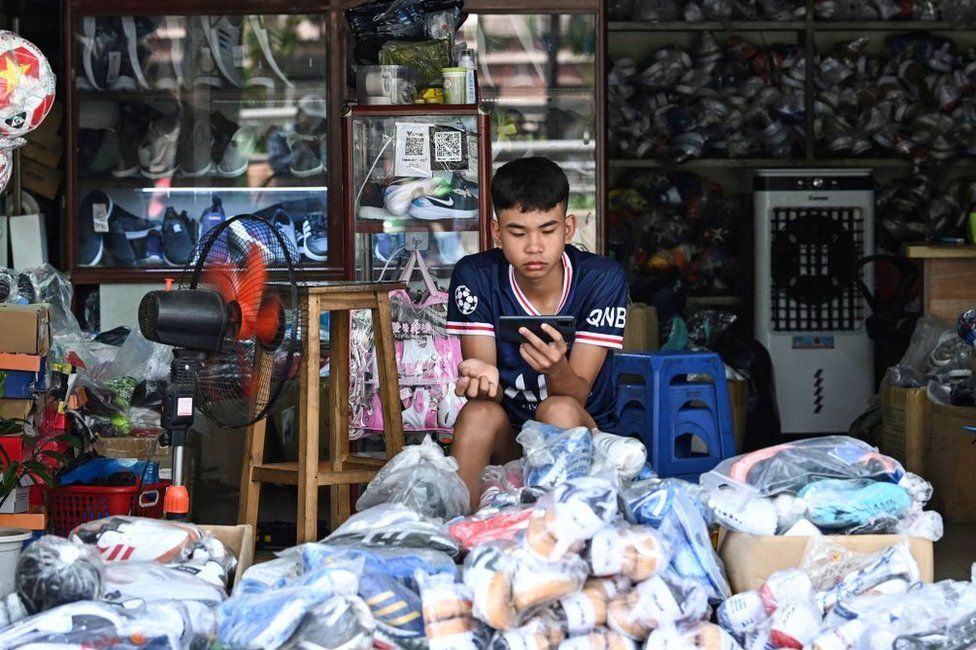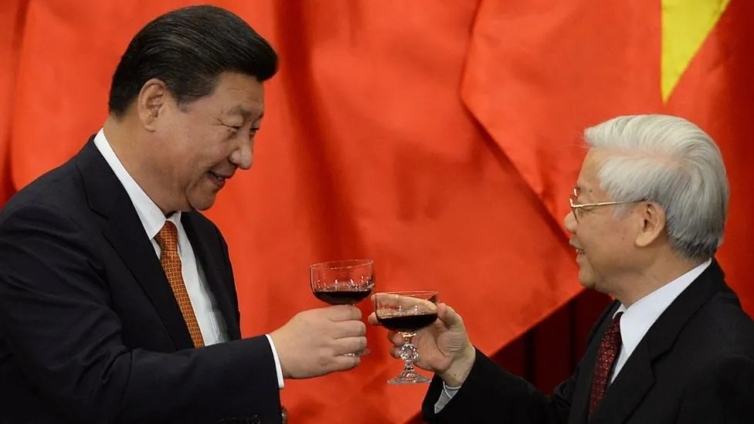When Chinese leader Xi Jinping meets his Vietnamese counterpart, Nguyen Phu Trong on Tuesday, on a state visit to Vietnam, expect a fountain of flowery compliments exalting the historic friendship between these two communist-run neighbours.
Mr Trong visited Beijing a year ago and was given China's top medal for foreign dignitaries, with Mr Xi describing their relationship as one between "comrades and brothers", the two countries "connected by mountains and rivers, as close as lips and teeth".
Vietnam is expected to announce it will join Mr Xi's "Community of Common Destiny", a Sino-centric, largely symbolic conception which is widely viewed as a challenge to the prevailing, US-led global order.
That would neatly nudge China one step ahead of the US in their competition for Vietnam's allegiance, after the US, in a surprise move, had its status elevated to that of "Comprehensive Strategic Partner" during President Joe Biden's visit to Hanoi in September. This put Washington on the same level as Beijing in Vietnam's carefully calibrated hierarchy of international partners.
During this week's visit, China will also be offering its advanced railway technology to help Vietnam upgrade its transport infrastructure. This includes a rail link from southern China to the Vietnamese port of Haiphong, which passes through a region that has some of Vietnam's richest rare earth deposits - China is the world's biggest exporter and refiner of the minerals which are essential to produce electric vehicles and renewable energy.
What they will certainly not talk about, at least publicly, is the bitter territorial dispute between them over islands in the South China Sea, nor their acrimonious relationship in the 1970s and 80s, which included a full-scale border war in 1979 that killed thousands of soldiers on both sides. There will also certainly be no mention of China's long historic colonisation of Vietnam, known there as "nghìn năm bắc thuộc" or 1,000 years of northern occupation, or of Vietnam's grievances over the impact of Chinese dams on the Mekong river.
But these points of friction are being discussed online in Vietnam, where the internet is less tightly policed than China.
"We only want peace, so President Xi please don't come," wrote one Vietnamese Facebook user. "If Xi Jinping removes the nine-dash line, the two countries can become brothers immediately," wrote another, referring to China's expansive claim to nearly all of the South China Sea.

Public sentiment in Vietnam can be more fiercely anti-Chinese than anywhere else in South East Asia. It is stirred by the proud nationalism of a country which won its independence after defeating both the French and the Americans, and by historic fear of its giant northern neighbour. This sentiment has always required careful handling by Vietnam's communist leaders.
In recent years there have been occasional anti-Chinese protests. There were even riots in 2014 which killed several people and destroyed dozens of foreign-owned factories, after China positioned an oil rig in what Vietnam considers its own territorial waters. A few years ago shops began appearing in Hanoi promising to sell only Vietnamese-made goods, and none from China.
Lately both governments have avoided provocations like the 2014 oil rig, cooling public feelings on these issues, but they are never far below the surface. Emotions over the nine-dash line - referred to contemptuously in Vietnam as the cow's tongue - run so high that this year the authorities banned the movie Barbie because it appeared to show a map with the contested Chinese claim marked on it.
Vietnam has also been reluctant to accept Chinese investment under Mr Xi's Belt-and-Road initiative, in part because of the risk that those investments may stir up resentment of China's economic footprint.
And that footprint is huge - far too big for any Vietnamese leader to risk damaging, whatever the public's views of China.
China is Vietnam's largest trading partner, with two-way trade approaching $200bn (£159bn) a year. China is the biggest foreign direct investor in Vietnam, dwarfing the US. This despite all the talk of Vietnam as an alternative manufacturing hub for US companies as they seek to reduce their dependence on China. Some of that investment is even driven by the US policy of de-coupling from China, as Chinese companies shift production to Vietnam to try to get around new US restrictions.
On top of that there is still an ideological bond between the leadership of the two countries; Mr Xi and Mr Trong are both hardliners steeped in the authoritarian ideologies of their parties, ill-disposed towards Western democratic values and determined to maintain the iron grip of their parties on political life.

Yet there will always be a profound difference in their strategic outlooks.
China's is that of an emerging superpower, determined to challenge the unipolarity of the US-led post-Cold War order and to be the dominant influence in its region. Vietnam's is that of a middle-sized power, determined to extract as much benefit and security as it can by balancing its relations between the US-China rivalry - and with historically close ties to Russia, which it still values.
Mr Trong calls this "bamboo diplomacy", a flexible foreign policy in line with the four "Nos" that have defined Vietnam's approach after it ended its pro-Soviet isolation in 1986: no military alliances, no siding with one country against another, no foreign military bases on Vietnamese territory, no use of force in international relations.
The idea is to be friends with all and an enemy of no-one. Yet China will be under no illusions that the upgrade in Vietnam's relations with the US this year is anything else but a hedge against Chinese influence and its assertiveness in the region.
For Vietnam's leaders, though not necessarily its people, China must be first among all the many other friendships they seek. But that relationship will always be hostage to events; either a flare-up in the South China Sea, or any other act by China seen as high-handed by the Vietnamese.
Latest Stories
-
Newsfile to probe suspended CJ’s legal battle and Accra flood crisis this Saturday
9 minutes -
Gifty Anti inspires young women to rise above challenges at TAF College’s 2025 Freelancers launch
23 minutes -
Police restore calm in Adoagyiri after violent clashes between youth groups
31 minutes -
Obstructionist behaviour must not be tolerated – Prof Kwesi Aning warns
44 minutes -
Wontumi alleges intimidation and threats amid raid at his residence
45 minutes -
GREDA urges pricing discipline as cedi strengthens against dollar
47 minutes -
Ghana scales up fight against obstetric fistula with free surgeries in five hospitals
47 minutes -
“We step in when communities need us”- Agro Crown Director on borehole commissioning in Ofosu
48 minutes -
NUGS launches National Youth Festival 2025 with strong stakeholder support
48 minutes -
Adansi Rural Bank launches new product for artisans and MSMEs in its catchment
1 hour -
My accounts were frozen without prior knowledge; I couldn’t pay my children’s fees – Wontumi
1 hour -
CEO of Margins ID Group highlights Ghana Card’s role in healthcare at ID4Africa Summit
2 hours -
2024/25 GPL: Accra Lions on the cusp of relegation after 3-1 loss to Hearts
2 hours -
GETFund warns public against fraudulent scholarship scams
2 hours -
Ivan Bruce-Cudjoe launches bid for GBA presidency, promises to reset Ghanaian boxing
2 hours

